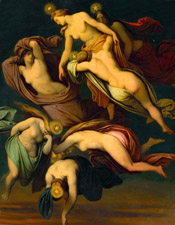Goethe’s Roman Elegies
, translated by Kline, A. S. (contact-email)
Johann Wolfgang von Goethe (1749-1832) was in Italy and Sicily from 1786 to 1788, a period that profoundly influenced his poetic and philosophical development. In Rome, his proximity to the remnants of the Roman Classical world, and in Sicily, to Classical Greek architecture, deepened his appreciation of ancient Greco-Roman culture—a process shaped by Winckelmann’s writings. This immersion in Classicism moderated his early Romantic tendencies, impacting his subsequent works. Works such as Iphigenia in Tauris (1787), Roman Elegies (1795), the prose journal Italian Journey (1817), and the latter part of Faust (1832) are particularly reflective of this shift. The text translated here adheres to the original edition with its twenty elegies, published in German as Römische Elegien in Friedrich Schiller’s literary periodical Die Horen (The Horae or The Hours). The appended notes elucidate the more arcane references within the Elegies.

Kline, A. S.
Support Open-Access:
Your contribution keeps our classical translations available to all. Every dollar helps support classics education and funds the expansion of our catalogue. Value what we do? Donate now.
File Downloads:
© Copyright, All Rights Reserved. This work may be freely reproduced, stored and transmitted, electronically or otherwise, for any non-commercial purpose. Conditions and Exceptions apply.